9 must-read digital transformation books in 2025
Digital transformation is crucial for businesses wanting to keep up with technological growth. Start your digital transformation journey with this list of essential books for 2025.
Digital transformation has become a necessity for businesses in almost every industry. Whether it's updating existing technologies to optimize business processes or establishing a cultural change across departments, most organizations need to transform some aspect of their business to thrive in today's digital economy.
This is easier said than done, as enterprise leaders balance day-to-day demands and cost pressures with the need to implement transformative digital technologies and processes that help drive growth and customer satisfaction.
The books on our list -- a selection from recent years -- will help you navigate the challenging path to digital transformation. Written by an array of digital experts, from consultants and professors to business executives and IT professionals, the books cover a wide range of topics: how to develop a strategy, how to increase the role of IT, how to avoid digital transformation failures, how to become a vigilant leader and more.
In no particular order, here's our list of 9 useful digital transformation books to consult in 2025.
1. Digital Transformation: Survive and Thrive in an Era of Mass Extinction
Author: Tom Siebel
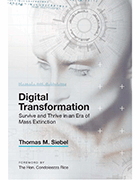
Description: This book provides the why instead of the how of digital transformation, helping readers better understand four major disruptive technologies -- cloud computing, big data, AI and IoT -- that got us where we are in today's digital age. Tom Siebel, a Silicon Valley entrepreneur and CEO of AI software provider C3 AI, interweaves the history of technology with real-world examples of global case studies on digital transformation initiatives for an educational and informative read.
This article is part of
What is digital transformation? Everything you need to know
Lessons learned: Readers will walk away with a firm grasp of the relationship between today's disruptive technologies, their impact on government and business and how organizations can harness them to survive and thrive.
2. The Cold Start Problem: How to Start and Scale Network Effects

Author: Andrew Chen
Description: Andrew Chen, general partner at venture capital firm Andreessen Horowitz and former Uber executive, breaks down the fundamentals of the network effect and why understanding how it works has become a matter of success or irrelevance in the digital age.
Lessons learned: Chen draws on interviews with CEOs and founders of some of the digital economy's biggest success stories, including LinkedIn, Twitch, Zoom, Dropbox, Tinder, Uber, Airbnb and Pinterest. This information is meant to offer advice on how to use the network effect and capitalize on products from the get-go.
3. Designed for Digital: How to Architect Your Business for Sustained Success

Authors: Jeanne Ross, Martin Mocker and Cynthia Beath
Description: Jeanne Ross and Martin Mocker, from MIT's Center for Information Systems Research, and Cynthia Beath, professor emerita at University of Texas at Austin, offer guidance to established companies on how to retool their business models for digital success. It's not simply a matter of deploying digital cloud, mobile apps, AI and other digital technologies. The practical advice includes examples from marquee companies, including Amazon, Bank of New York Mellon, DBS Bank, Schneider Electric and others.
Lessons learned: "Disrupt or be disrupted" have been the watchwords for legacy companies for more than a decade. Drawing on five years of research and in-depth case studies, Designed for Digital promises to help companies develop business models that can pivot quickly in response to new threats and opportunities.
4. Digital Trailblazer: Essential Lessons to Jumpstart Transformation and Accelerate Your Technology Leadership
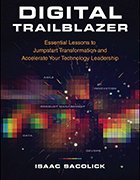
Author: Isaac Sacolick
Description: Digital transformation thought leader Isaac Sacolick followed up his 2019 Amazon bestseller, Driving Digital, with a new book in 2022: Digital Trailblazer. Sacolick, the founder and president of technology leadership company StarCIO, homes in on the leadership skills required to lead digital transformation projects. How do you educate colleagues on the value of utilizing data? When detractors threaten to derail your transformation programs, how do you win over their support? Drawing on his experience as a technologist and consultant, he offers vivid accounts -- names changed, but expletives included -- of the challenges he's seen over a long career and ends each chapter with a section on "Digital Trailblazer" lessons.
Lessons learned: With more than 50 lessons, Digital Trailblazer promises to catapult technology and business professionals out of their comfort zones and resonate with a range of digital transformation leaders and foot soldiers, from product managers to technology experts.
5. The Economics of Data, Analytics, and Digital Transformation
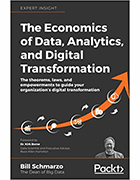
Author: Bill Schmarzo
Description: This book delves into the economic value of data as a renewable and reusable resource for countless different applications in today's digital era. Bill Schmarzo, executive fellow at the University of San Francisco School of Management and author of four books about big data and data science, discusses clear steps organizations can take toward achieving actionable insights, realizing discovery from data and deriving economic value from analytics.
Lessons learned: Readers will walk away with an understanding of how to become value-driven with their data use, how to use data asset valuations and economic principles to guide data investments, and how to empower teams for digital transformation success.
6. See Sooner, Act Faster: How Vigilant Leaders Thrive in an Era of Digital Turbulence (Management on the Cutting Edge)
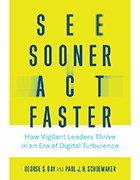
Authors: George Day and Paul Schoemaker
Description: In an era of rapid technology change, an organization's survival depends on leadership that can anticipate threats and spot potential opportunities amid the turbulence. In See Sooner, Act Faster, strategy experts George Day and Paul Schoemaker draw on a variety of use cases -- such as Adobe's and Intuit's move to the cloud and the digital challenges Mastercard faced early on -- to show how leaders must adopt "vigilant leadership." The authors offer tools to help leaders survive digital disruption, as well as an action guide with tips for instilling vigilance and agility within their organizations.
Lessons learned: Business leaders will learn how vigilance and quick action responses can help their organizations not only survive major disruption but also ultimately achieve higher profits, growth and organizational longevity.
7. Driving Digital Strategy: A Guide to Reimagining Your Business
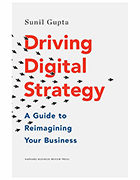
Author: Sunil Gupta
Description: In Driving Digital Strategy, author and Harvard Business School Professor Sunil Gupta offers traditional organizations an extensive framework for reimagining and digitally transforming their business operations. Gupta examines case studies where traditional companies successfully harnessed digital technologies. The advice includes in-depth tips and best practices in every area of an organization, including business models, value chain, customer relationships and company culture.
Lessons learned: Readers will gain a better understanding of how to strategically go about a digital transformation initiative within traditional organizations.
8. Why Digital Transformations Fail: The Surprising Disciplines of How to Take Off and Stay Ahead
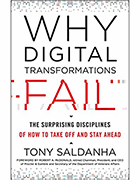
Author: Tony Saldanha
Description: Why do so many digital transformations fail? According to Tony Saldanha, former vice president for IT and shared services at Procter & Gamble, it's not a result of the aimed-for innovation per se or the technology; instead, it's a lack of clear, defined goals and a disciplined process. Saldanha dives into how business leaders can go from simply automating business processes to making digital technology the foundation of an organization through a five-stage process. He also identifies the two disciplines that are vital to digital success and includes a checklist of questions to keep leaders on the right path forward.
Lessons learned: Saldanha's extensive experience, supplemented by real-world case studies and how-to advice, gives readers an understanding of the importance of planning in a transformation initiative.
9. The Digital Transformation Roadmap: Rebuild Your Organization for Continuous Change
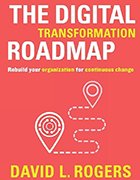
Author: David L. Rogers
Description: In this book, David L. Rogers describes how the road to successful digital transformation consists of not only altering business practices but also the organization as a whole. Maps of how to perform organizational change, practical case studies and planning resources are all found in Rogers' latest book, as well as extensive descriptions of the most common digital transformation barriers.
Lessons learned: Through real-world examples from Rogers' experiences with advising larger businesses, this book serves as a guide for how to perform real change. As new technologies continue to develop, Rogers provides details on how an organization can keep up with this changing digital landscape.
Editor's note: This article was updated in December 2024 to improve the reader experience.
Gabriella Frick is a former site editor for TechTarget.






